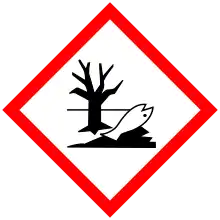Tetra-n-butylammonium bromide
Tetra-n-butylammonium bromide (TBAB) is a quaternary ammonium salt with a bromide counterion commonly used as a phase transfer catalyst.[2] It is used to prepare many other tetrabutylammonium salts by salt metathesis reactions. The anhydrous form is a white solid.[3]
 | |
| Names | |
|---|---|
| IUPAC name
Tetrabutylammonium bromide | |
Other names
| |
| Identifiers | |
3D model (JSmol) |
|
| ChEBI | |
| ChEMBL | |
| ChemSpider | |
| ECHA InfoCard | 100.015.182 |
| EC Number |
|
PubChem CID |
|
| UNII | |
CompTox Dashboard (EPA) |
|
| |
| |
| Properties | |
| C16H36BrN | |
| Molar mass | 322.368 g/mol |
| Appearance | White solid |
| Melting point | 103 °C (217 °F; 376 K) Decomposes at 133C[1] |
| Hazards | |
| Main hazards | Harmful |
| GHS pictograms |   |
| GHS Signal word | Warning |
| H302, H315, H319, H335, H411, H412 | |
| P261, P264, P270, P271, P273, P280, P301+312, P302+352, P304+340, P305+351+338, P312, P321, P330, P332+313, P337+313, P362, P391, P403+233, P405, P501 | |
| Related compounds | |
Other anions |
Tetrabutylammonium tribromide, Tetra-n-butylammonium fluoride, Tetra-n-butylammonium chloride, Tetra-n-butylammonium iodide, Tetrabutylammonium hydroxide |
Other cations |
Tetramethylammonium bromide, Tetraethylammonium bromide |
Except where otherwise noted, data are given for materials in their standard state (at 25 °C [77 °F], 100 kPa). | |
| Infobox references | |
Preparation
Tetra-n-butylammonium bromide can be prepared by the nucleophilic substitution reaction of tri-n-butylamine with n-butyl bromide.[3]
Properties and uses
Tetra-n-butylammonium bromide is used to prepare other salts of the tetrabutylammonium cation by salt metathesis reactions, and acts as a source of nucleophilic bromide ions for substitution reactions. It is one of the most commonly-used phase transfer catalysts. As its melting point is just over 100 °C and decreases in the presence of other reagents, it can be considered an ionic liquid. As an ionic liquid, it might be used as a solvent in various reactions, for instance cross-coupling reactions.[3]
See also
- Tetrabutylammonium tribromide, with an additional Br2 unit
- Tetrabutylammonium fluoride
- Tetrabutylammonium hydroxide
References
- Applied Catalysis A: General 241 (2003) 227–233
- Henry J. Ledon (1988). "Diazo transfer by means of phase-transfer catalysis: di-tert-butyl diazomalonate". Organic Syntheses.; Collective Volume, 6, p. 414
- Charette, André B.; Chinchilla, Rafael; Nájera, Carmen. "Tetrabutylammonium Bromide". In Paquette, Leo A. (ed.). Encyclopedia of Reagents for Organic Synthesis. doi:10.1002/047084289X.rt011.pub2.